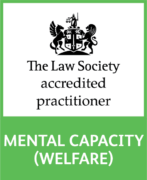 Our specialist team of Court of Protection lawyers, led by Sarah Griffiths-Jones, are able to advise you on all aspects of mental capacity law.
Our specialist team of Court of Protection lawyers, led by Sarah Griffiths-Jones, are able to advise you on all aspects of mental capacity law.
If you have a loved one who has been assessed as lacking mental capacity to make a decision, be it through an illness such as dementia, a condition they were born with such as autism, or perhaps following a life changing accident, whereby they have acquired a traumatic brain injury, then the team at Reeds are here to help you.
It may be that your loved one has been removed from the family home against their wishes and deprived of their liberty in a care home or hospital setting, with the Court now responsible for making the decision as to where they should reside, or a question over what care and treatment they should receive has arisen.
You may be a professional advocate, representing the protected party (P), and require legal representation to bring a challenge against the Deprivation of Liberty Safeguards (DoLS) on P’s behalf before the Court of Protection.
Alternatively, it may be that you need legal advice to enable you to make financial decisions on your loved one’s behalf and want to become their lay deputy.
Whatever the issue in this area of law, rest assured our experienced team can provide you with specialist and tailored advice and guidance UK wide to best support you throughout the legal process.
Reeds Solicitors’ Court of Protection team was named ‘one to watch’ in the Legal 500, 2023. It recognised both our ‘excellent team ethos’ and the ‘array of talent’ on our team.
Call us today on 02921 679737 to discuss your case or complete enquiry form on our contact page here.
Accreditation

Two of our solicitors have received the Mental Capacity (Welfare) Accreditation and have been appointed as Accredited Legal Representatives by the Law Society.
This accreditation recognises a quality standard for practitioners who offer advice on health and welfare matters under the Mental Capacity Act 2005 and expertise in working with vulnerable individuals and their families.

We also benefit from three solicitors who have received the Mental Health Accreditation from the Law Society which recognises expertise in representing clients detained under the Mental Health Act 1983.
There is often a lot of overlap between Court of Protection and Mental Health work so this additional knowledge is incredibly valuable in fully advising all our clients.
Reeds Solicitors’ Court of Protection team was named ‘one to watch’ in the Legal 500, 2023. It recognised both our ‘excellent team ethos’ and the ‘array of talent’ on our team.
